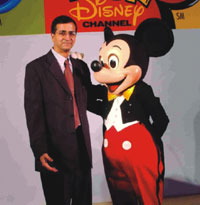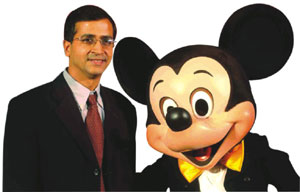| |
Making the Disney mouse Roar
Under Rajat Jain, Disney hopes its kids channels
will be a toon de force in India, but beating entrenched players won’t be
child’s play
By Nishtha Shukla
 |
|
There’s tumult in toon town. Nine years after scouting the
Indian market, Mickey Mouse finally has an Indian passport. And leading the
Disney waltz into the country is TV industry veteran Rajat Jain. With Disney
making up for lost time, Jain, who is the vice-president and managing director,
clearly has no time for mousing around. Without beating around the box, Walt
Disney Television International, India, has already launched two channels, the
flagship Disney Channel and Toon Disney in English, Hindi, Tamil and Telugu.
|
|
The channels will take up all of Jain’s time. Disney’s size
and reputation notwithstanding, it is going to be a tough haul for the Little
Big Mouse in the country. With reason. God of small kids Cartoon Network is
sharpening its pixels, UTV’s kiddy channel Hungama is making waves and
Nickelodeon is trying to get its act together.The question that pops up is whether Disney is slow off the
block with the kids’ market already carved up and saturated, or is the Disney
brand strong enough to make up for lost time?
|
|
 |
Jain, an alumnus of the Indian Institute of India, Delhi, and the Indian
Institute of Management, Ahmedabad, says Disney has worked out a
clear strategy for India. “A lot of people have asked me about this, saying the
Indian kids market is already overcrowded and about our timing in this market.
Research shows that less than 10 per cent of Indian kids’ television viewing
time is spent on children appropriate content. This means they are watching
general entertainment 90 per cent of the time. With our two channels, Disney
Channel and Toon Disney, we aim to change this,” he stresses. What gets Jain
superanimated is the fact that 11 per cent of the Indian population is under
 |
|
the age of four, making it the world’s largest pre-school
kids audience. Yet, he says, there is very little content for them. Eyeing this
segment, Disney has a four-hour block, Playhouse Disney on Disney Channel, every
day that is aimed at these kids, young mothers and caregivers.
With 130 movie
titles, the channels will air two films daily, as well as eight live action
series, eight pre-school shows and 20 animated series. And with 400 episodes of
local production in the first year - making it the biggest localised commitment
outside the US - Jain is attempting to establish a solid footprint across the
country |
|
However, data on kids channels in India show the kiddy segment is no
kindergarten party. Children’s channels are certainly not in the league of Star
Plus or Sony. Despite the addition of three kids channels during the year—
Animax, Hungama and Pogo—the channel share in the TV universe for kids went up
marginally from 3.1 per cent in January-April
2004 to 3.5 per cent in the September-December 2004, according to TAM Media.
| |
 |
The advertising share is even more dismal and is said to be
just over 1 per cent of the advertising pie. While such dismal statistics may scare even hard-boiled TV
executives, for Jain they are mere flickers that will fade away. His parent
company has deep pockets—last year Disney posted revenues of over $7 billion.
And he is not afraid of a looney tunes cable clash—distributed by Star, Disney
is expected to pursue a largely subscription-based revenue model. The company’s case is that though it has launched late, its
commitment to the Indian market is not wanting. It is the first market in Asia
where it has launched with two channels simultaneously—the flagship Disney
Channel and Toon Disney. “We are typically not first movers in most markets; yet,
because of our strong brand and content we are in the lead in eight of 10 Asian
markets,” says Jain, who has worked previously with Sony Entertainment
Television and Hindustan Lever. Post its current soft launch, the company is expected to
drive pay revenues from next year and possibly bring a few more channels like
Playhouse Disney and Jetix, its new brand after the acquisition of Fox Kids.
A key niche that the US has created—and which is sorely
lacking in India—is child-led family viewership. Call it the ET syndrome. The
movie was one of the biggest grossers of all time because each child who came to
see it brought at least one parent along. Similarly, kids drive viewership at
home, too. With 60 movies a month on Disney Channel, Jain aims to tap this
family viewership need. Family, after all, is what Disney has grown on back in
America. Disney movies succeed not merely because they appeal to the least
common denominator but because Walt Disney Productions carefully-and
exclusively-addresses itself to the most common problem of the entertainment
consumer: “Where can we take the kids?”
Disney wants to be the answer to that question. “Disney’s
enduring values are in line with India’s age-old tradition of family values,
says Jain, who is an avid reader of Amar Chitra Katha comics. “The Disney brand
stands for ‘special entertainment with heart’ and our programming is based on
the principles of decency, fun, community, storytelling, optimism, innovation
and quality.” Disney’s rich heritage of movie and music presents unique
opportunities for the company in the market given the vast library of family
movies, many of them in the genre of musicals. Says Walt Disney International President Andy Bird: “The
Indian marketplace is developing quickly and represents strong growth
opportunities for all of our businesses as Indian consumers have a strong
affinity for the Disney brand.”
Bird is sure Disney has picked the right man for the job.
“In an increasingly competitive and diversified marketplace, Jain’s outstanding
abilities, which he has successfully demonstrated over the years in the Indian
industry, will be a significant asset,” he says. As Disney’s India head, Jain’s area of responsibility will,
however, be far bigger than just managing the two channels or a localised
version of ABC that is expected to come later. Under Jain’s purview will also be
film distribution, merchandising and the theme parks and resorts business.
Though, of course, he says the fabulous parks will have to wait just yet.
According to industry sources, Disney has identified 900
acres of land in Gurgaon, on the outskirts of Delhi, on which will be located
the third Disney theme park to come to Asia after Tokyo and Hong Kong.To give you an idea of the sheer size of the theme parks
business in Disney’s scheme of things, the Hong Kong park is due to open in 2005
and will cost around $3 billion. But before all that happens in India, Jain will have to
come up with some stuff that’s green and crinkly. Given the Disney brand, the
money is on Jain carving up a neat niche of the ad pie.
Says Walt Disney Television International (Asia-Pacific)
Executive Vice-President and Managing Director Doug Miller, “Rajat is an
outstanding and innovative executive who constantly finds new ways to grow
successful businesses by providing great services and value to consumers. We
believe, he is the right person to oversee Disney’s continued growth in India as
we strive to become one of India’s leading providers of high quality family
entertainment.” Our advice to the competition: build a better mousetrap.
Q & A
What do you think is the future of animation
in India?
India has an abundance of professional talent, technology and we are now seen as
a perfect place for outsourced work. Our storytelling heritage and understanding
of the English language needs to be fully explored.
How does Disney fit in Indian culture?
Disney's enduring values are in line with India's age-old tradition of family
values. Our programming is based on the principles of decency, fun, community,
storytelling, optimism, innovation and quality.
Walt Disney tried entering India 8-10 years
back. Why come back now?
Of the 30 million TV viewers under the age of 14, less than 10 per cent is
accounted for by kids channels. Clearly this is an underserved audience segment.
What are Walt Disney’s future plans here?
We are taking a comprehensive approach to a variety of Disney business
initiatives in India in line with an overall strategy, including opportunities
in new media; motion pictures, consumer products, publishing, live entertainment
and other business proposals.
Any plans of a theme park?
We will evaluate the business viability for theme parks at a later stage.
What about plans to localize content?
We have over 200 hours of original local production in the first year itself.
|
|